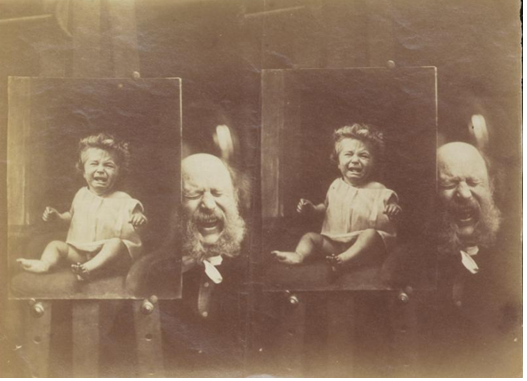In the 1860s Darwin began collecting photographs of emotional expression. They seemed to capture fleeting movements of the face, and allowed him to observe with more detachment. But the technology was still new. Even under the best conditions, exposure times were several seconds. Among Darwin's chief objects of study were infants, and he was disappointed that he had been unable to find an image of a baby crying. Oscar Rejlander, a Swedish émigré with a studio in London, came to the rescue. Rejlander was well-known for sentimental portraits of children. He was a skilful artist, able to elicit expressions from his subjects, and to alter the print to create the illusion of an emotional moment. Rejlander produced a number of crying babies, much to Darwin's delight. He also posed himself, enacting disdain, astonishment, fortitude, and helplessness as would an actor on the stage. 'It is very difficult to get, at will -- those expressions you wish… So I have tried in propria persona - even cut my moustache shorter to try to please you.'
Darwin appreciated the appeal of photographs to readers, and decided to include many in his 1872 work, On the expression of emotions in man and animals. Rejlander's prints colour the pages of the book, not only his screaming babies, but his own theatrical expressions, and his elaborate velvet coat and hat. Photographs helped to make Expression Darwin's most popular book. They show his use of novel methods and techniques, and his ability to engage with popular culture, to draw on Victorian sentimentality and melodrama in order to excite readers' emotions, and encourage them to become active observers themselves. Part of the arrangement with Rejlander was that Darwin agreed to become a photographic subject. In exchange for his highly charged emotional portraits, the photographer got Darwin's stolid countenance, aged, bearded, and highly collectible. 'You ask for a Bill', Rejlander joked, 'You cannot pay for good will.'
Paul White



